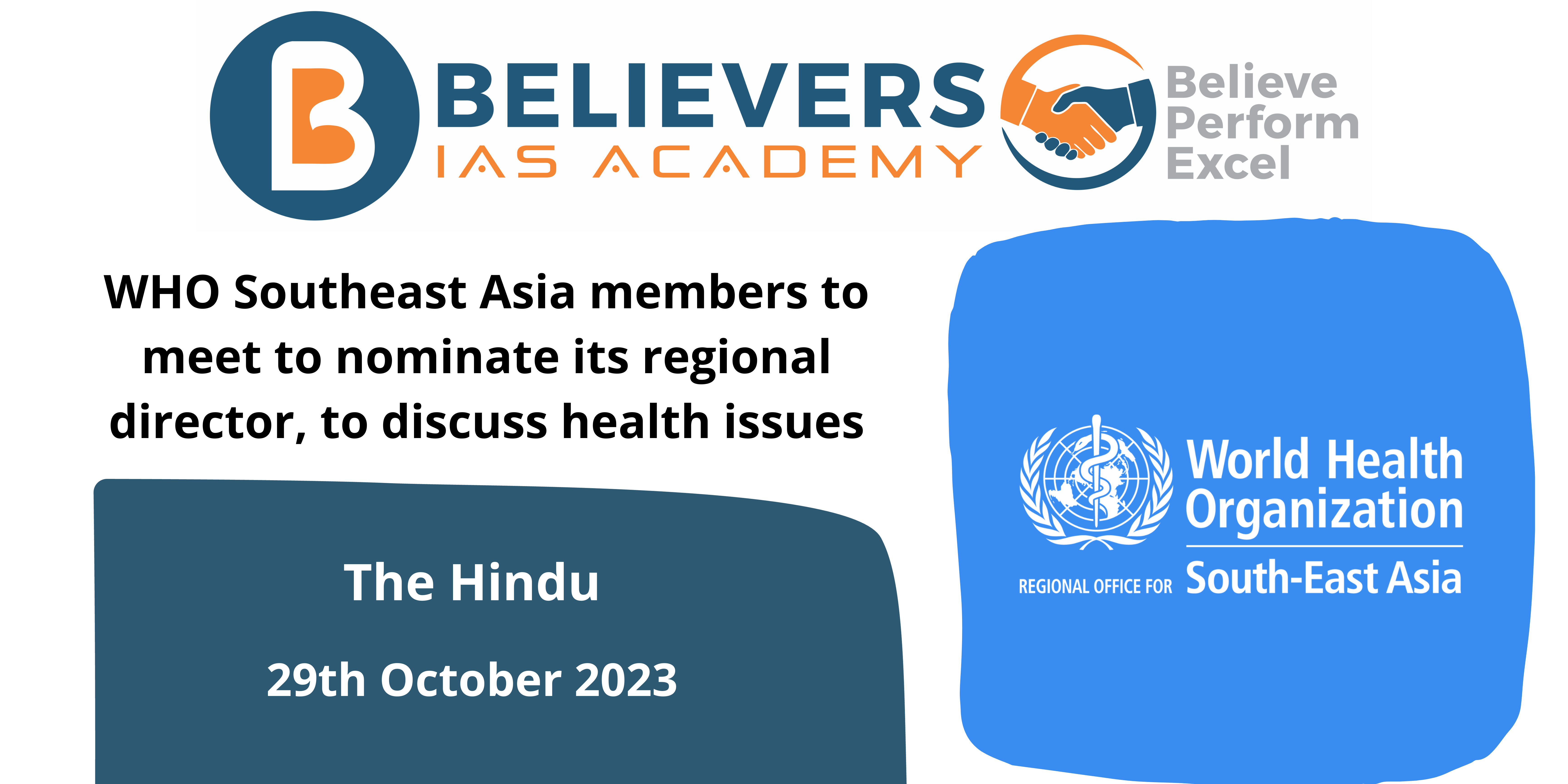WHO Southeast Asia members to meet to nominate its regional director, to discuss health issues
Context
Health Ministers and senior officials from the World Health Organization‘s Southeast Asia member countries will gather in New Delhi next week to discuss priority health issues and nominate the new WHO Regional Director for Southeast Asia.
What is the role of the Regional Committee for South-East Asia?
- The Regional Committee for South-East Asia is the World Health Organization’s (WHO) governing body in the Southeast Asia Region. Representatives from the region’s 11 Member States and Associate Members serve on the committee.
- The committee’s tasks include the following:
- Providing health-related leadership
- Developing evidence-based policy alternatives
- Providing technical assistance
When is the next session about to be scheduled?
- Dates of Meeting: The 76th session of the WHO Regional Committee for Southeast Asia is set to take place from October 30 to November 2. This biennial gathering provides a forum for Southeast Asia’s Health Ministers and senior officials to discuss critical health issues.
- Attendees: This session will feature prominent people such as WHO Director-General Tedros Adhanom Ghebreyesus and South-East Asia Regional Director Poonam Khetrapal Singh. Their participation emphasizes the importance of the conference.
What are the key topics that are on the agenda of the meeting?
- Cardiovascular Disease: Discussions will centre on approaches to improve cardiovascular disease prevention and control. This is critical since cardiovascular illnesses are the main cause of morbidity and mortality around the world.
- Neglected Tropical Diseases: Another priority is to eradicate neglected tropical diseases. These diseases primarily affect underprivileged people and can have serious health consequences.
- Regional Health Security: Improving regional health security will be discussed. Given the worldwide interconnection of events such as the COVID-19 pandemic, increasing health security is critical for early detection and response to health risks.
- Primary Healthcare: A ministerial roundtable will be organized to highlight the significance of boosting primary healthcare as a method of achieving universal health coverage. Primary healthcare is critical to guaranteeing universal access to healthcare.
- Nominations of the Regional Director: One of the most important components of the meeting will be the nomination of the future WHO Regional Director for Southeast Asia. Saima Wazed of Bangladesh and Shambhu Prasad Acharya of Nepal are the two contenders contending for the seat. The chosen nominee will be elected to a five-year term through a vote.
What are the major achievements achieved by the Regional Committee for South-East Asia?
- Disease Elimination: The region has eliminated polio, as well as maternal and neonatal tetanus, since 2014, indicating considerable improvement in public health.
- Measles and Rubella: Four nations have successfully eliminated measles and rubella, including Bhutan, the Maldives, Sri Lanka, and Timor-Leste, demonstrating progress toward public health goals.
- Neglected Tropical illnesses: Efforts in the region to eliminate neglected tropical illnesses have also proven successful. Lymphatic filariasis has been eradicated in countries such as the Maldives, Sri Lanka, Thailand, and Bangladesh. Trachoma has been eradicated in Nepal and Myanmar, and India has been declared yaws-free.
- Maternal and Child Health: Maternal, neonatal, and under-5 mortality rates have all decreased. Between 2000 and 2020, the region saw a 68.5% decrease in maternal death, a 45% decrease in under-5 mortality, and a 39% decrease in neonatal mortality. Five nations have met Sustainable Development Goals (SDG) targets for under-5 mortality and newborn mortality.
Conclusion
In summary, the 76th session of the WHO Regional Committee for Southeast Asia is a significant event that addresses a wide range of critical health issues, celebrates achievements, and establishes future priorities, with a particular emphasis on improving healthcare accessibility, disease control, and health security in the region.




